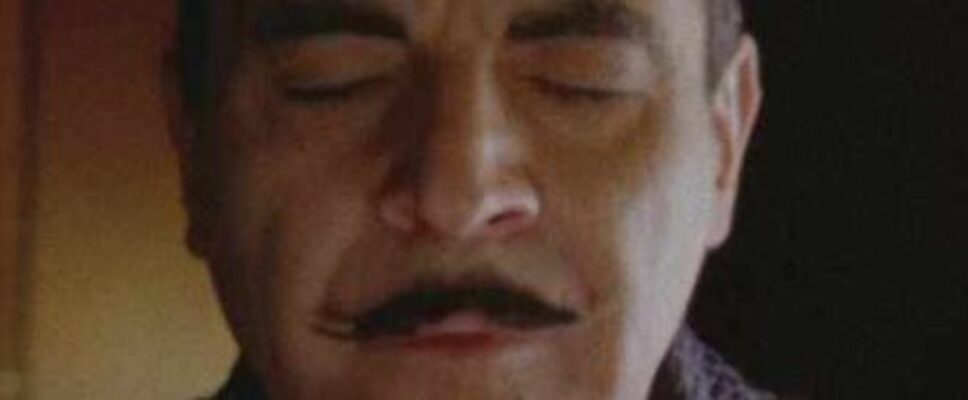Teresa Reviews “Murder on the Orient Express” (2010)
Teresa reviews “Murder on the Orient Express” (2010) and found this version forgot the true victims in the Daisy Armstrong case.
Fidelity to text: 3 1/2 knives
![]() Add a suicide (caused by Poirot), a stoning (which he disregards), Ratchett supposedly repenting, and Col. Arbuthnot taking justice into his own hands.
Add a suicide (caused by Poirot), a stoning (which he disregards), Ratchett supposedly repenting, and Col. Arbuthnot taking justice into his own hands.
Quality of movie on its own: 3 1/2 knives
![]() Beautifully filmed, dressed, acted, and a terrific score. The train looks great! It’s nice to see stokers too, showing how trains are powered. But I didn’t like this Poirot.
Beautifully filmed, dressed, acted, and a terrific score. The train looks great! It’s nice to see stokers too, showing how trains are powered. But I didn’t like this Poirot.
Read more of Teresa’s Agatha Christie movie reviews at Peschel Press.
Also, follow Teresa’s discussion of these movies on her podcast.

Here, however, he’s not just grumpy over human foibles. He’s angry. He’s got reason to be, but at the same time, I couldn’t accept the climax in the bar car where he rants about individuals taking justice into their own hands. I believe what we’re seeing is Poirot being forced to see the limitations of human justice systems and the fact that humans are inherently messy and flawed. Expecting the perfectibility of humanity “if only everyone followed this set of rules” is an idiot’s game.
Why is Poirot a well-dressed ball of rage? The film opens with him solving a supposed murder in Palestine involving a British officer. The woman’s death was accidental but the officer with whom she’d been having an affair lied and lied and lied, thus complicating the investigation. Poirot (naturally) solves the crime and confronts the young, adulterous officer about his failings. The officer snatches a pistol and blows his brains out, spattering blood and brain matter on Poirot. If Poirot had been less harsh, would that have happened? Leaving the young officer’s wife a widow and probably penniless to boot? Maybe not.

At the hotel, Poirot can’t check in and relax. A message from Scotland Yard awaits, summoning him back to London ASAP. He meets M. Bouc, an acquaintance who’s high up in the Wagon-Lit food chain. M. Bouc gets Poirot a berth on the fully-booked Orient Express by having him take the bed belonging to someone who hasn’t arrived. Well. The train’s leaving and he’s in a hurry. Poirot boards and meets his new and unpleasant roommate.

Poirot’s angry. He’s always angry when he’s cold and damp and a man he could have saved is dead because he chose not to. After all, murder is always wrong.
Isn’t it?
Except that in this case, Ratchett is really Cassetti, a notorious kidnapper and murderer.
I want to be very clear on this because virtually every review of Orient Express gets this wrong.
Ratchett didn’t only murder Daisy Armstrong!
He kidnapped her, then killed her within the hour. He never had any intentions of handing her over in exchange for the ransom. However, indirectly, he murdered five other people. Those people shouldn’t be forgotten. Who are they? Daisy’s unborn sibling. We’re never told whether Sonia (mom) was carrying Daisy’s brother or sister, but believe me, the obstetrician who delivered the grossly premature, guaranteed-to-die baby knew. So did Sonia and Colonel Armstrong. That baby counts. Sonia died soon thereafter. She counts. Grief and horror overwhelm Colonel Armstrong and he shoots himself. He counts. The French nursery maid is accused by the local police of aiding and abetting the kidnapper. She hangs herself in her cell. She counts. Her mother dies of grief. She counts.
Ratchett didn’t shoot them down in cold blood, but he murdered them just the same.

It’s perfectly understandable why these twelve people plot Ratchett’s execution. The state, which they relied on, found him innocent of kidnapping and murder. We’re told the prosecutor mishandled the case. I’d suggest that the judge and the jury were also either bought off or intimidated into letting Ratchett go free.
The Armstrong family and friends were denied justice. As though they didn’t matter. What are they supposed to do?
I understand Poirot complaining about vigilante justice, especially after seeing that woman stoned. He’s always been on the side of the law. Except, of course, when he’s not. I’m thinking particularly of Dead Man’s Folly. He lets abettor Amy Folliat and her murdering son take the easy way out. They aren’t hauled off to face the Crown. Did the Tucker family get justice for Marlene and Old Merdell? No, they did not. They’re peasants so I suppose they don’t matter.
I can accept Poirot having a crisis of conscience. I can’t accept his open cruelty to people who’ve suffered terribly and who will continue to suffer terribly until the day they die. Clearly, compared to crystal pure, abstract justice, they don’t matter.
And for those who claim that Ratchett was repenting?

Nothing else in Ratchett’s behavior showed that he’d gotten religion. He creeps on Mary Debenham. He’s rude to his secretary and valet. I agree he was sorry. Sorry he got caught and sorry his life was being threatened. Sorry over murdering Daisy and five other people? No, you didn’t hear a single word about them in his prayer. Because they didn’t matter.
They do matter. And so do the Armstrong family and friends, something this version seems to have forgotten.


